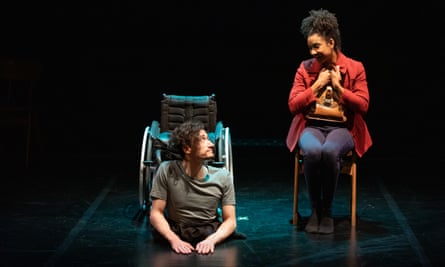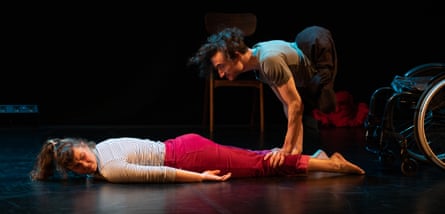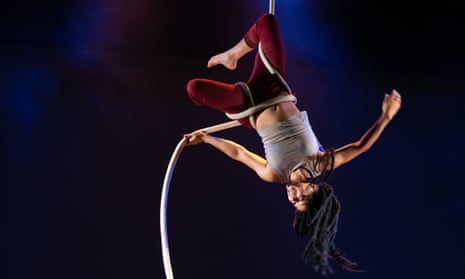On a bare black stage, Jonny Leitch is remembering an act of kindness: a janitor offering him a stick of gum while he sat in a hospital waiting room. As Leitch’s recorded voice narrates the story, a black loop appears suspended from the air and he hoists himself from his wheelchair into it, performing a graceful, balletic arc high above it.
This is one of the scenes that makes up Human, the latest production from integrated circus company Extraordinary Bodies. Devised over the past year with a cast of disabled and non-disabled performers, Human combines circus skills with digital recordings to illustrate formative moments in the company members’ lives – from first kisses to personal traumas and life in lockdown. The result is a polyphony of experiences told through speech, song and movement, centring each tale in the nuances of human life.
Extraordinary Bodies, which celebrates its 10th anniversary next year, was founded when artistic directors Billy Alwen and Claire Hodgson met while creating an integrated performance for the 2012 Olympic Games opening ceremony. In the years since, the circus company has become the largest of its kind in the UK, prioritising equality of access, race and gender in its performances.

“Before Extraordinary Bodies, my experience of working with disabled people in theatre was that people would always think it was really risky,” Hodgson says. “But in circus, people are much better at assessing real risk and not imagined risk. So they would say, ‘yeah, of course people who are blind can hang off cranes, we just need to work it out’. That was a real breath of fresh air and it gave us the confidence to be radical, joyous and bold.”
Hodgson’s experience as an 18-year-old taking part in a show in which half the cast was disabled was an eye-opener and convinced her that integration would have to be at the core of her future work. “It was the first time I’d ever met so many disabled people,” she says. “I got to see how they were often placed into a totally separate experience from childhood. One which we’re all the poorer for.”
For Leitch, his route into performance was unusual – but one that typifies the challenges in finding talent for integrated companies. “I joined the company as a musician, which is what I trained in, but once when I was in the rehearsal room, I mentioned that I used to get around by walking on my hands,” he says. “Billy’s ears pricked up and he asked me to show him. From then on, I’ve become trained as an aerialist, too.”
“People don’t encourage disabled kids who have a physical curiosity to try out circus,” Alwen says. “So we have to find our talent in unusual ways, since there are very few formalised training paths. We need to show young people that this is a viable opportunity and find all those who should be in circus but who are not here yet.”
The value of this representation pays off in empowerment for others. “People need to know what disabled lives are like,” Leitch says. “If a younger disabled audience can see themselves reflected, that changes how they view their possibilities in the world.” For non-disabled dancer and aerialist Alfa Marks, her presence as a mother and a black woman in Extraordinary Bodies has been equally encouraging to audiences, too. “Rebecca, who is performing in Humans, has told me many times that it was seeing a video of me that got her into circus,” she says. “She didn’t realise that you could be muscly and black and still get work. She thought you had to be skinny and blond to succeed in this world.”
It is not only the onstage talent that needs to be changed but institutional attitudes too. “It’s a long, slow revolution,” Hodgson says. “In the last 10 years, there has been a big change in representation for TV and film but there are also structural changes that need to happen. Access should be 20% of any budget across the board, since 20% of the population is disabled, but so far the work that we’ve done is to simply put different people at the table. What we haven’t yet done as a society is to take the table away and get out of the room into the real world.”

Hodgson references the work of pioneering British integrated companies such as Graeae and Stopgap, who have paved the way and trained many of the Extraordinary Bodies performers. Yet with the Covid-19 pandemic taking a sledgehammer to an already underfunded performance ecosystem, there are fears that this legacy could vanish.
“The UK needs to become the number one place for inclusivity,” says David Ellington, Extraordinary Bodies’ profoundly deaf interpreter. “We have such a rich history of diverse companies operating against the odds and they have helped show that we are not invisible any more. The pandemic has meant that some performers have had to retrain and there is a risk that many won’t come back, but these lockdowns have shown us that there is a huge value to the arts. Companies like Extraordinary Bodies need to keep going for another 10 years and they can’t be the only ones doing it.”
Until then, there is the story of the past 18 months to tell in Human, and it seems that audiences are already being moved. “It takes a lot of bravery to put such personal stories on stage but I’ve never seen an audience not want to leave a theatre like after these shows,” Alwen says. “They want to stay and talk about what they’ve seen, as it goes from laughter to tears quite quickly, which is where we’ve all been recently too.”
Human is at the Civic, Barnsley, 8-9 October and touring until 14 May.

Comments (…)
Sign in or create your Guardian account to join the discussion